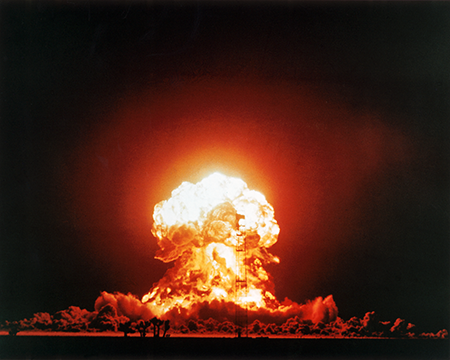"I greatly appreciate your very swift response, and your organization's work in general. It's a terrific source of authoritative information."
No Need to Test, Says NNSA Nominee
May 2025
By Xiaodon Liang
U.S. President Donald Trump’s nominee to head the National Nuclear Security Administration (NNSA) said he “would not advise testing” nuclear weapons above the criticality threshold.

But the nominee to be administrator, Brandon Williams, testifying at his April 8 Senate Armed Services Committee confirmation hearing, also noted that a decision to resume explosive nuclear testing would be “above [his] pay grade.”
Williams’ comments came in response to questioning by Sen. Jacky Rosen (D-Nev.), who expressed concern that resuming explosive nuclear testing could create “severe economic and environmental impacts.” The Nevada National Security Site, where NNSA conducts subcritical nuclear experiments, almost certainly would host any potential underground explosive test.
Rosen said China and Russia would probably resume explosive nuclear testing if the United States were to test first, and those countries “have more to gain from testing than we do, given our superior scientific and computer-modeling capabilities.”
Williams, a former Navy ballistic-missile submariner and Republican congressman, agreed that explosive testing during the Cold War had provided data to underpin the “scientific basis for confirming the stockpile since the moratorium in 1992.”
Scott Pappano, a Navy vice-admiral nominated to be Williams’ principal deputy at NNSA, also told the same Senate committee April 29 that he “would not advocate for nuclear testing based on the amount of data we have.”
Concerns about a resumption of testing have grown since Robert O’Brien, a national security advisor in Trump’s first term in office, wrote in Foreign Affairs in June that “Washington must test new nuclear weapons for reliability and safety in the real world for the first time since 1992—not just by using computer models.”
During O’Brien’s government tenure, a group of U.S. officials discussed testing in May 2020, according to a report in the Washington Post. (See ACT, June 2020.)
The technical need for testing has been dismissed by officials involved in the U.S. stockpile stewardship program. Marvin Adams, the deputy administrator for defense programs at NNSA under the Biden administration, told reporters on a tour of the Nevada National Security Site Dec. 13 that “based on purely technical considerations, we are confident that we can get the information we need [through] subcritical” experiments and other elements of the stockpile stewardship program.
The 2020 debate considered not only technical arguments, however, but also policy justifications such as intimidating nuclear peers during arms control talks.
A report by the Trump-aligned Heritage Foundation in July called for reducing the time needed to prepare an underground explosive nuclear test to six months. Under a requirement last reaffirmed in 2022 by the Biden administration, the NNSA is required to be ready to conduct a test with limited diagnostics within 36 months.
In September, Russian Deputy Foreign Minister Sergey Ryabkov told news agencies that Russia “will not conduct [supercritical nuclear tests] if the United States refrains from such steps.”
